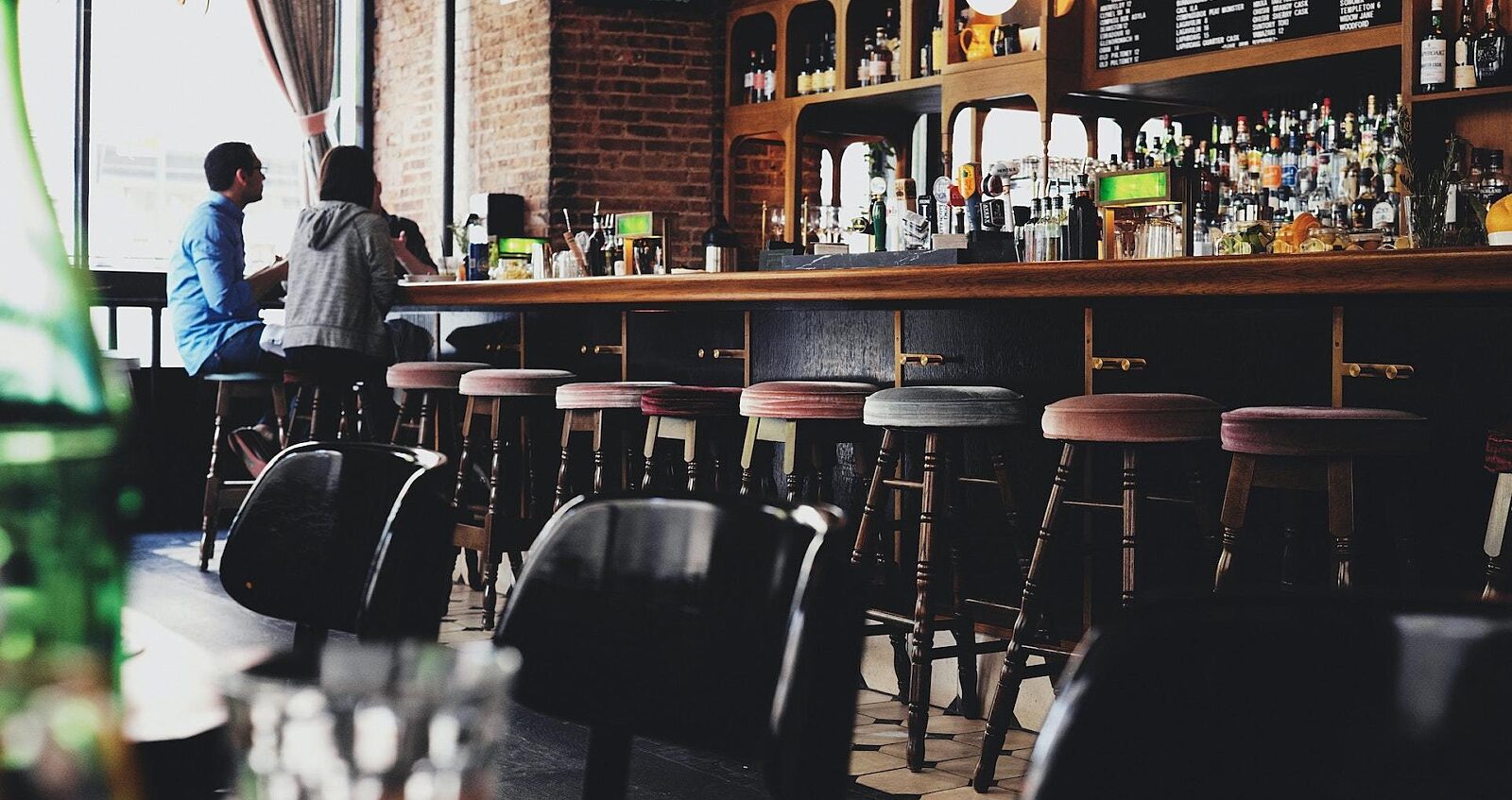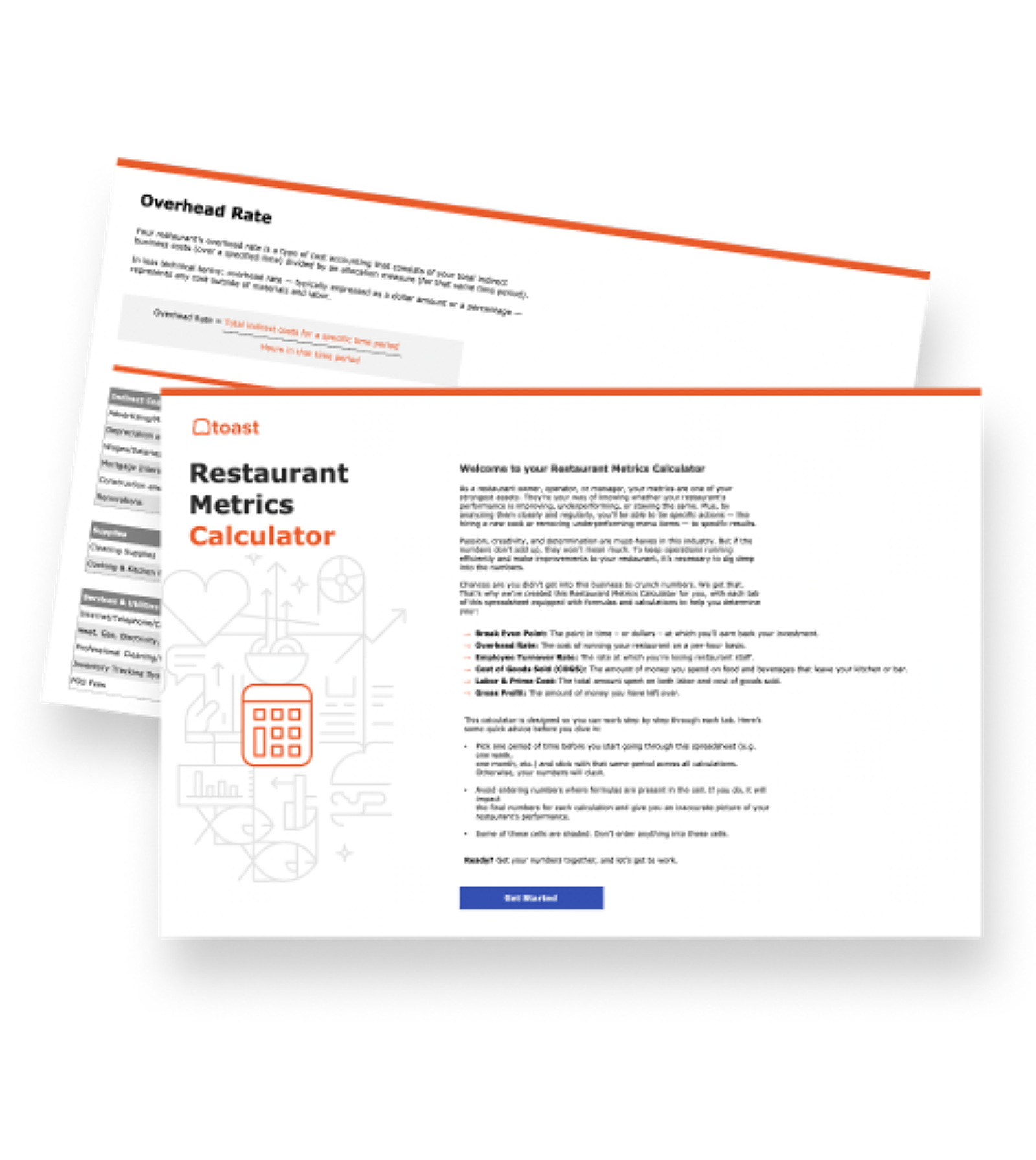
How Much Does it Cost to Open a Small Restaurant in London? [Small Restaurant Startup Costs]
Here are the startup costs for opening a small restaurant in London, along with resources to create a custom business plan for your new establishment.

Katherine BoyarskyAuthor


Restaurant Metrics Calculator
Use this free calculator to calculate the key restaurant metrics needed to understand the health and success of your business.
Get free downloadHow Much Does it Cost to Open a Small Restaurant in London?
London's culinary scene is dotted with gems that come in small packages, proving that size isn't a barrier to success. These small venues often blend cosiness with inventive or niche menus, paving a path for entrepreneurs on a tight budget.
Consider the story of Jiro Dreams of Sushi, a documentary that spotlights the illustrious sushi maestro Jiro Ono and his compact, Michelin-starred Tokyo eatery Sukiyabashi Jiro. With just 10 seats, it highlights the chef's dedication to his art, offering top-tier fish and ingredients.
Do you feel inspired and curious about the financial costs of opening your own small restaurant in London? This overview will cover the essential startup costs alongside tactics and strategies to guide you to your grand opening. Whether your dream is to launch a quaint café or an exclusive, fine dining gastronomic haven – we’re here to help.
Restaurant Business Plan Template
No matter where you’re at in your restaurant ownership journey, a business plan will be your north star. Organise your vision and ensure that nothing is overlooked with this free template.

Average Restaurant Startup Costs
When assessing the startup expenses for a London-based eatery, various elements dictate the necessary budget. Factors like the choice of premises, kitchen apparatus, seating arrangements and floor plan, and rent expenses mean the average initial cost for launching a restaurant in the capital can fluctuate considerably, staying in the ballpark of approximately £175,000 to over £750,000. This range mirrors London's eclectic food sector and the city's premium on location and quality.
Restaurant Startup Costs for a Small Restaurant
Let's dive into the costs of getting a small restaurant in London up and running compared to setting up something a bit bigger, say around 4,000 square metres. For the bigger full service restaurants, you're looking at startup costs averaging about £575,500. Smaller spots though, like a cafe or food trucks, won't need as much cash since they're cosier and take up less space. But remember, a lot depends on where you're opening, whether you're buying or leasing, and how much TLC (like renovations) the place needs.
Don't forget about the one-off costs, either. We're talking kitchen gadgets, kitchen display systems, restaurant pos software, those pesky credit card processing fees, receipt printers, cash drawers and all the bits and bobs like chairs and tables. As we get into the nitty-gritty of what all this stuff costs, keep in mind that going small can stretch your budget further, especially if you're leaning towards renting instead of buying or if you've got some funding in your corner to kick things off.
With quite the spectrum of startup costs for a small London restaurant, keep in mind savvy budgeting can truly stretch your pounds, turning your London restaurant dream into a tangible reality.
Restaurant Opening Cost by Square Foot
Space rental costs in London hover around £47 per square foot. The figure can fluctuate based on various factors like the size and design of the venue, its location, the equipment restaurant point of sale system needed, and whether you're moving into an existing establishment or starting from the ground up.
A cosy diner or a compact, fine dining restaurant typically needs between 1,000 to 2,000 square feet to operate smoothly, covering kitchen, dining, and bar areas. For instance, imagine snagging a 1,000-square-foot spot in Shoreditch, complete with furniture, kitchen gear, and fittings, for £100,000, plus another £30,000 for enhancements. On the flip side, building a brand new 1,000-square-foot hospitality business from scratch could push your budget even higher.
Small Restaurant Startup Costs To Expect
As a business owner you’ll know to kick off your budgeting and small restaurant business plan with this handy cost checklist. You’ll take London by storm in no time!
1. Utilities
Before your London restaurant's doors officially open, essential services such as gas, electricity, and water need to be up and running. These utilities and providers typically account for 3-5% of your total operating expenses, marking them as significant contributors to your startup costs. However, for those dreaming of launching a small restaurant in London, there's a silver lining – your expenses for these essentials are likely to be at the lower end of the spectrum, or perhaps even a bit less.
2. Location
Deciding on the perfect location for your London restaurant is a crucial step in the planning process. As you fine-tune your startup budget, keep in mind the long-term impact of your location choice. A prime spot in a high-traffic area of London—not just central but also in bustling neighbourhoods—can be a golden investment, minimising your need to spend on marketing and PR to attract guests.
In London, your location options vary, and each comes with its considerations and costs:
- For ease of use, you could renovate an existing structure in one of London's vibrant districts to become your restaurant.
- Take over an existing restaurant or coffee shop, perhaps in an area known for its culinary scene, like Soho or Shoreditch.
- Invest in building a brand new establishment, allowing for full customisation – consider a trendy area like Peckham or Brixton to stand out.
Starting with an already operational restaurant in London might save you some initial outlay, but constructing a new venue, despite being the most expensive option, offers the chance to create a bespoke space that could become the next landmark in London’s dining landscape.
3. Kitchen Equipment and Restaurant Furniture
A restaurant isn't just about the space; it's about filling that space with the right kitchen equipment and interior touches that bring your culinary and aesthetic vision to life (and customer satisfaction of course!). Essential appliances are crucial not only for preparing the menu but also for crafting an environment that resonates with Londoners.
You'll also need to think about other elements that contribute to the atmosphere, like table management, lighting, signage, a sound system for music, and window dressings.
When budgeting for kitchen equipment and the overall interior design, it's easy to see costs escalate quickly. However, with careful and strategic planning, you can manage these expenses effectively. The key cost drivers will undoubtedly be your choice of kitchen gadgets and the furniture that sets the tone of your dining area.
Budget-wise, expect to allocate between £35,000 and £100,000 for equipment and furnishings.
4. Pre-Operating Expenses
Ensuring your London restaurant's grand opening is a smash hit means paying close attention to pre-operating expenses. This includes investing in a robust training program to bring your staff up to speed on your expectations and the level of service you aim to provide.
Ensure your inventory is fully stocked. And remember, it’s more than food, too. Think dishes, glasses, beverages, napkins, and other necessary items to offer the best dining experience you can offer. Note that the costs here can differ based on your seating capacity and various other elements. It might be wise to consider an inventory management system to help you keep track of everything. Nowadays you can automate an inventory management system and connect it to you restaurant pos system via restaurant integrations.
Financially, you should prepare to spend between £25,000 and £40,000 on food and utensils to start, plus around £2,100 per month for each employee.
5. Marketing and PR
Your marketing and PR approach will need to be as unique as your restaurant, especially in a city as vibrant and diverse as London. Whether you're opening a luxury dining spot or a casual eatery, your strategy to draw in diners and establish a strong brand identity will need to be customised.
For franchise operations, much of the marketing may be handled by the parent company, but independent restaurants in London will need to dive deep into marketing and PR to stand out in the bustling capital's food scene. Collaborating with a local marketing firm could be a great way to get your name out there, or you might start building buzz yourself by making the most of social media platforms like Instagram to flaunt your most eye-catching dishes. A local marketing agency can also help craft the customer experience and advise on things like gift cards for customers and loyalty programs that can stand out in the area.
Your marketing toolkit should be varied, incorporating everything from email blasts to keep potential customers in the loop, to active social media engagement for community building, to a well-designed website for easy menu perusal and bookings, and even branded merchandise to foster loyalty and excitement.
Investing in a comprehensive marketing and branding strategy is essential for making your mark in London’s competitive dining landscape, ensuring your restaurant not only opens with a bang but continues to thrive.
Price Range: 3-6% of sales.
Restaurant Marketing Plan
Create a marketing plan that'll drive repeat business with this customizable marketing playbook template and interactive calendar.

6. Restaurant Capital and Business Loans
Launching your restaurant in London—or anywhere, really—isn't a guarantee of instant success. Building a reputation and growing your customer base typically requires time and a good dose of patience. It's realistic to expect sales to climb slowly at first as you begin to establish your presence in the local dining scene.
For new restaurateurs, securing funding that covers at least the initial six months of operation can provide a much-needed safety net. This financial buffer can help navigate the unpredictable waters of starting a new business, allowing you to focus on refining your offerings and customer experience without the immediate pressure of turning a profit. Planning for this gradual growth and ensuring you have the funding to support it is crucial for the long-term success of your London restaurant.
As a rule of thumb, set aside six months of operating costs for contingency.
7. Restaurant Exterior Design
Ensuring your small restaurant's exterior is as inviting as its interior is a smart move, especially in a city as visually oriented as London. The facade of your restaurant plays a critical role in attracting passersby and can be a key factor in your overall success. Investing in appealing lighting, tasteful landscaping, and, if space allows, charming outdoor seating can significantly enhance your small restaurant's curb appeal.
Even if your budget doesn't stretch to a major overhaul of the exterior, don't underestimate the power of effective signage. A well-designed sign does more than just announce your presence; it extends your brand identity to the outside world and doubles as a marketing tool, inviting potential customers to step inside.
The cost of these enhancements can vary dramatically depending on the extent of the work and the quality of materials used. Keep in mind, if you're planning significant changes, you may also need to factor in the cost of obtaining the necessary planning permits.
Price range: £100 to upwards of £100,000.
8. Organisational and Development Costs
When you're caught up in the whirlwind of launching your small restaurant in London, it's easy for the finer details of functionality to slip through the cracks. Yet, securing the necessary licenses and permits should be at the top of your to-do list, alongside sorting out utility and insurance deposits, food service licenses, and perhaps a liquor license if you plan to serve alcohol.
These elements are crucial for the orderly operation and growth of your restaurant. Although obtaining them can be both time-consuming and costly, it's imperative to have these administrative tasks in hand to avoid any legal hitches or delays in your opening.
In terms of costs, you're looking at a range of licenses from about £100 to £1,905, depending on the specific requirements and scale of your operation. Insurance, another non-negotiable aspect of running a restaurant safely and responsibly, can cost between £750 and £1,500 annually.
9. Professional Services
Just as crucial as getting all your licenses and permits in order is ensuring your restaurant's operations are smooth and compliant, particularly when it comes to financial and legal matters. This is where bringing in seasoned professionals can make a significant difference. Solicitors, consultants, architects, designers, accountants, bookkeepers, marketing agencies, and PR firms all play vital roles in the restaurant industry, offering expertise that can help your business thrive from the get-go.
These professionals can assist with everything from ensuring your restaurant design meets real-time regulations, to keeping your finances in check, to building a strong brand presence in London's competitive market.
The cost of their services typically varies based on experience and expertise. hiring such talent might require a large investment as you prepare to launch your new restaurant.
Price range: Up to £55,000 in professional service fees.
10. Food Cost
Gearing up for your London restaurant's opening means having your pantry and stockroom filled to the brim. It’s a key step to restaurant management. This step is also super important to dodge any hiccups with supply shortages and keeps your service running like a well-oiled machine. The cost of food and supplies will swing depending on the menu you've got planned out. Fancy dishes and specialty drinks? They'll naturally bump up your costs a bit.
Allocating a large chunk of your budget is vital, as it directly ties into both the quality of what you're serving and how well your numbers add up at the end of the month. Keeping a sharp eye on your inventory spend is key to keeping your kitchen happy and your guests coming back for more.
Price range: 25% to 35% of total food and drink sales on inventory costs.
10. Restaurant Staff
Your team is the heartbeat of your restaurant and can be the key factor is growing customer loyalty in your area. How many folks you need on deck and the vibe of your place can really swing your staffing costs, but usually, you're looking at labour being about 30% of your total income.
Figuring out your restaurant's labour costs is a smart move when you're mapping out your business plan. It helps you get a grip on the finer details, like how much you'll be paying your staff. These costs are not only for staff time, you might want to check out employee management software to help you run your restaurant efficiently.
Price-wise, you're likely to see labour costs sit at about 20-30% of your restaurant's gross revenue.
11. Technology and Point of Sale Systems
Leveraging restaurant operations technology in your restaurant can significantly enhance your operational efficiency. Seamless communication between the front of house and back of house kitchen staff (via pos hardware connected to a kitchen display system) ensures that your establishment operates more smoothly, distinguishing your business from competitors. The right tech integrations not only streamline service but can improve the dining experience for your customers.
Things to consider as part of the technology set-up are online ordering, payment processing options and card readers, credit card fees, cash registers, restaurant point of sale (touchscreen iPads or Android based durable hardware, cloud based pos solution), add-on kiosk screen, a system with automated tableside ordering and software to build end of day sales reports etc.
Explore restaurant technology options like the Toast POS system.
Restaurant POS Comparison Tool
A free, customizable Restaurant POS Comparison Tool to research and compare point of sale systems in one Excel spreadsheet or editable PDF.

Open a Small Restaurant with Big Flavours
As a new restaurant owner, taking a good look at your available funds and figuring out how you’re going to spread that budget around is key.
Sure, you might end up spending a bit more or less than you planned, but having a clear financial roadmap really helps. It guides you through all the choices you need to make as you set up, making sure you're putting your money where it matters most. This approach is vital for finding your footing and standing out in London’s bustling restaurant scene.
Related Resources
Is this article helpful?
DISCLAIMER: This information is provided for general informational purposes only, and publication does not constitute an endorsement. Toast does not warrant the accuracy or completeness of any information, text, graphics, links, or other items contained within this content. Toast does not guarantee you will achieve any specific results if you follow any advice herein. It may be advisable for you to consult with a professional such as a lawyer, accountant, or business advisor for advice specific to your situation.
Subscribe to On the Line
Sign up to get industry intel, advice, tools, and honest takes from real people tackling their restaurants’ greatest challenges.
